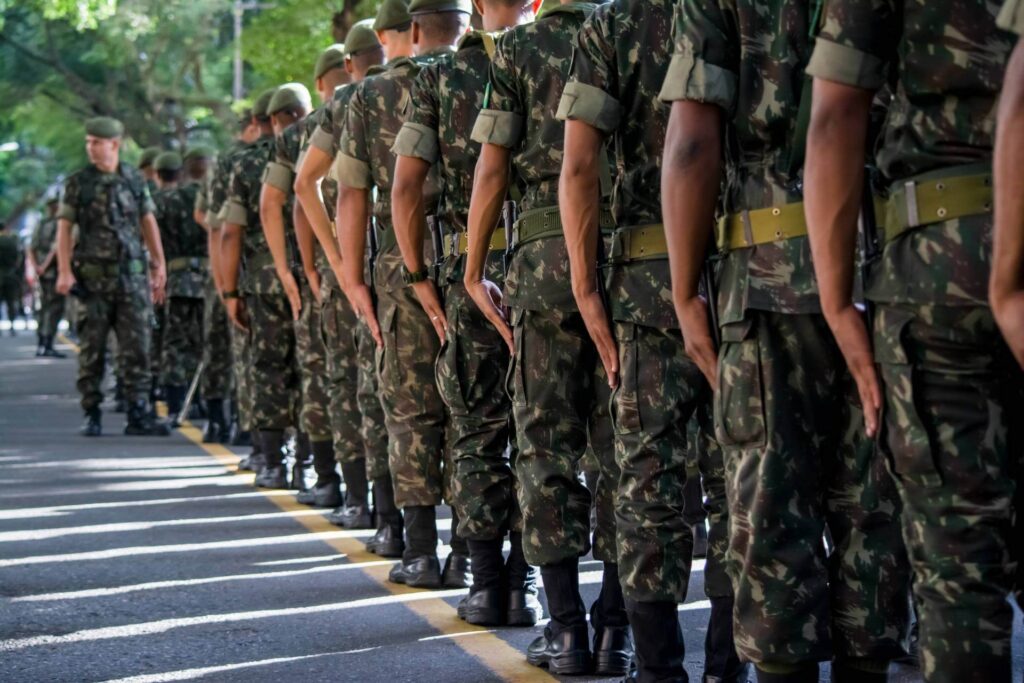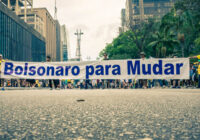Former Brazilian President Jair Bolsonaro’s political career was connected with criminal groups from the start. His election came with ample support from police, the military and the militia, so much so that a coup was orchestrated in the capital on January 8, 2023 to protest his re-election loss. Additional information about the insurrection can be found in the first part of this series.
Related Reading
It is no secret that Bolsonaro had his hand in criminal factions. In fact, his connections to the infamous Office of Crime faction, headed by militiaman Adriano da Nóbrega, are still under investigation. It is also no secret that Bolsonaro was a staunch supporter of violent militia. In a speech to the National Congress in 2003, he defended the idea that “death squads” were a perfect solution for Rio de Janeiro’s public security crisis. He had consistently used his position as a politician to support death squads and distributed medals and jobs among well-known militia members, especially from Rio.
In 2008, Bolsonaro intended to find a way to legalize militias as a part of the governmental apparatus against crime. It is clear that he bolstered the relation between paramilitary groups and organized crime. The Brazilian state has become unstable due to this rise in war as governance. Unfortunately, the ignorance did not start with him. The problem runs much deeper.
How criminal groups have become Rio’s political elite
In the state of Rio, paramilitary death squads were hired and ordered by army generals and police commanders to eliminate “undesirables.” This includes journalists, academics and those in the military who disagree with the regime. In fact, a new book about Nóbrega reveals that three Rio de Janeiro politicians were assassinated by Brazil’s Office of Crime. Death squads are also responsible for the development of torture techniques and methods to dispose of bodies.
These infamous paramilitary groups first appeared in the late 1950s. They didn’t rise to power until the 1960s, when a Ku Klux Klan-inspired organization became legal and official after a military coup in 1964. Composed of low-ranking, retired and expelled military personnel, these militias acted much like the Italian Mafia. They would sell “protection” for businesses in violent, low-income communities while simultaneously acting as guns-for-hire to the political and economic elites.
Throughout the 1970s and 1980s, these militias took control of expanding favelas — Brazilian slums — in Rio and São Paulo, disputing power with drugs and weapons. These groups often collaborated with criminal organizations. In some cases, paramilitaries would completely replace them. Their chokehold over favelas such as Rio das Pedras went from offering protection and assassinations to controlling basic services and transit.
By the 1990s, militias had shifted their focus to politics. Militia members exchanged safety for votes and quickly became a large caucus within both state and federal houses of representatives. The war over territories grew exponentially during this decade. The two largest criminal factions, Comando Vermelho (CV) and Primeiro Comando da Capital (PCC), gathered support from criminal organizations across the country. The subsequent conflict led to an exponential increase in the number of casualties and an escalation in weaponry. Militias advanced into the territories under the guise of arresting or killing faction commanders. They were seen as agents of the state. Instead of ending the criminal activities, the militias became the kingpins of organized crime.
During the neoliberal governments of Fernando Collor de Melo and Fernando Henrique Cardoso, which lasted from 1990 to 1992 and 1995 to 2003, respectively, organized crime and militias lost their distinction. The criminal activities of the militias brought on an enormous cash flow, which created a need to establish money laundering schemes. This was especially important as many militia members were, at this point, starting political careers that drew the eyes of the law.
Business façades such as pharmacies, motorcycle companies, shops and restaurants were all used by militias as laundering hubs. Many of these schemes were caught by the Brazilian IRS due to discrepancies in their books. However, one scheme in particular remains prevalent today: the phenomenon of narco-Pentecostalism.
Rio’s state religions are a political force
Around this time, a religious revolution was taking place. Historically, the Roman Catholic Church has held a strong majority in Brazil. The Roman Catholic religion disallows its priests to hold political offices. From the 1970s on, however, religion no longer remained separate from Brazilian politics. Neo-Pentecostal megachurches preaching the American-inspired prosperity gospel started to spread their own political messages all over the country. The Universal Church of the Kingdom of God (UCKG) founded by bishop Edir Macedo became the most infamous of these religious-political sects.
Macedo is a controversial character. He gave blatant political speeches in his temples, placed many of his priests in politics and funded political parties and candidates. Accused of charlatanism, money laundering and other crimes, Macedo was arrested in 1992. By that time, he had already gained influential political power and escaped justice.
Macedo’s political power came from his absolute control over Brazilian media. In 1989, Macedo anonymously put up a bid to purchase the television network Record for 45 million reais. He did this despite knowing that the transfer of broadcasting rights to the head of a multimillionaire church could be challenged by Article 19 of the 1988 Constitution. The 1988 Constitution established Brazil as a secular country, and clearly forbade any governmental connection to religious institutions on its Article 19. As all media in Brazil are public concessions, the article could be interpreted as a constraint to the purchase of radio, television and printed media by churches.
Despite the illegality, the network quickly gathered a significantly large audience. Macedo preached that his followers would be awarded riches in life only if they contributed to his church. Under the government of Itamar Franco, in 1993, Macedo managed to get a judicial order allowing him to become the sole owner of Record Group, which also included many radio stations. Macedo amassed extensive political power as a result of this approval from the federal government. The purchase was only formally challenged in 2005.
By the end of the century, tax-exempt neo-Pentecostal churches of various denominations followed Macedo’s lead and combined political messages with their religious ones. The Evangelical Parliamentary Front in the Brazilian Congress and Senate already counts 189 members, representing 80% of political parties. Half of those parties belong to neo-Pentecostal denominations.
Religions are also a criminal force
Neo-Pentecostal parties didn’t restrain themselves to the legal sector of politics, however. Many old kingpins of favelas, devotees of African-derived religions, became targets of neo-Pentecostals under the guise of a fight against demonic forces. With the growth of Neo-Pentecostal churches, African-derived religious temples and priests started suffering attacks. Many were even expelled from their homes as militias affiliated themselves to intolerant denominations.
The intolerance is a result of a centuries-old prejudice that is intermingled with racism since colonial times. Rio’s favelas had been historically populated by members of African diaspora religions. Descendants of enslaved African peoples were left penniless and homeless after the abolition of slavery in 1888, and moved to large port cities such as Rio to look for work. Historically-entrenched racism drives neo-Pentecostal affiliated militias to target the African diaspora in favelas heavily.
As recently as 2021, 91% of religious intolerance attacks in Rio de Janeiro were aimed at African religions, and half of African-derived religious houses each suffered up to five attacks between 2020 and 2022. Their removal — either by threats or assassinations — quickly opened power vacuums that were promptly occupied by evangelical criminals. The new neo-Pentecostal kingpins pushed the population to vote for their candidates.
The rapid growth of the neo-Pentecostal denominations in favelas gave militias and organized crime a perfect way to launder illegal earnings. As all churches are tax-exempt in Brazil, they can declare any amount of money they receive as tithes. Churches are able to invest in those earnings, legitimate or not, without legal obstacles. Thus, militias, politicians and drug traffickers are tightly connected with neo-Pentecostal churches, as they can move money through temples without raising concerns from criminal investigators. The connection between these groups is illustrated by the dangerous campaign by the UCKG to indoctrinate the police force throughout Brazil. The mixing of religious indoctrination and security forces has been deemed “medieval” by some authors.
As a consequence of this tight-knit partnership, Brazil developed the very peculiar phenomenon of neo-Pentecostal-narco-militias, or narco-Pentecostalism. The phenomenon quickly took over large swaths of territory in Brazil’s most important cities. Consequently, narco-Pentecostalism has become influential in politics, business and media. In certain localities, like the city of Rio and the states of São Paulo and Minas Gerais, political candidates will not be elected unless they have the support of these groups. The political sector has been hijacked by crime.
The relationship between crime and politics has damaged Rio
Rio has witnessed wars between police forces, militias and organized crime for decades, especially in the metropolitan area. Since 1992, armed forces have been called upon many times to help with Rio’s security issues. Yet it seemed like they could never successfully solve the problem of rampant crime. In fact, scholars believe many of these attempts — such as the creation of Pacifying Police Units (UPPs) in 2007 — gave definite control over large territories to the militias.
In the past, the called-upon armed forces remained under state control. The 1988 Brazilian Federal Constitution guarantees autonomy to Brazilian states, making them responsible for their own public security. There are instruments, however, that allow the federal government to intervene in states under certain circumstances. These conditions are established in Article 34 of the Constitution. Operations using armed forces to restore order in states are called “Provision of Law and Order” (in Portuguese, Garantia da Lei e da Ordem, or “GLO operations”).
It is important to emphasize that the application of GLO operations can only be triggered in exceptional circumstances, and exclusively under presidential order. However, it seemed like former Brazilian President Michel Temer chose to ignore the “exceptional circumstances” stipulation when he ordered the 2018 federal intervention into Rio.
After the soft coup against former Brazilian President Dilma Rousseff in 2016, her right-wing vice-president Michel Temer took office. In his 2020 autobiographical book, he wrote how the armed forces commanders disapproved of Dilma’s attempt to modernize the syllabuses of military academies. A move to topple Dilma was welcome, Temer explained, and thus Dilma was out of the way on August 31, 2016. Temer later confirmed that he had several “conversations” with commanders such as General Eduardo Villas-Bôas and General Sérgio Etchegoyen — the latter of whom was later rewarded with command of the Institutional Security Bureau (in Portuguese, Gabinete de Segurança Institucional da Presidência da República, or GSI) — from 2015 to 2016.
Temer promptly gave the military complete control over sensitive areas of the government. He ensured his austere measures did not affect the armed forces. In October 2017, Temer even signed a law exempting military personnel working on a GLO operation from being taken to a civilian court in case of civilian deaths. This move virtually gave the armed forces free rein — including their most feared auxiliary branch, the Military Police — to kill with absolute impunity in case of military intervention.
The combination of Temer’s leniency toward the military and Rio’s neo-Pentecostal mayor proved fatal to Rio’s citizens. In January 2017, Marcel Crivella, nephew of Macedo, finally took office as mayor. He had received almost 60% of the city’s votes — over 1.7 million people — in the second round against left-wing lawmaker Marcelo Freixo. Freixo had been a sworn target of militias for more than a decade. As a provocation, Crivella’s last campaign rally was held in a tightly-controlled militia territory, as militia members had declared their support in his bid against Freixo.
Any federal move in the city could only proceed with the support of the state’s capital mayor, and Crivella was more than happy to provide that support. Thus, the state of Rio went under federal intervention in February 2018. Article 34 was applied due to “grave danger to public order,” despite the fact that the crisis was connected more to the chaos in public finances than any particular violent act. In fact, an increase of cargo theft in the state, not the violence in poorer communities, became an excuse to remove the acting governor’s powers. This was the first time a GLO instrument took place since re-democratization.
Armed platoons invaded citizen’s houses and took over territories, yet avoided militia-controlled areas. Community residents denounced soldiers and police agents for raping, torturing and killing innocent civilians. Scholars refer to the intervention as a war against the poor. 95% of the operations happened in low-income communities, using brute force, home invasions and shoot-outs as tools.
In the first months of the GLO, police killings increased 150% while no reduction larger than 20% in crime was recorded. The most notorious violence of that period was the assassination of Marielle Franco, Rio’s councilwoman. She had bravely denounced the intervention and brutal police tactics and pointed out the complicity between state and militias. This defiance cost Franco her life.
Overall, the operation was highly ineffective. Anthropologist Jacqueline Muniz, a specialist on public security, described the overtake as “the economic policy of fear production” from an authoritarian regime based on public unsafety. Many warned, even before the intervention, that strangling Rio’s poor communities would not end the problem. Militias still held complete power in 15 states. The ten-month intervention actually empowered militias, as they counted on the well-armed reinforcements sent for the GLO. It is obvious that militia members, armed forces and politicians share an incestuous relationship.
Sociologist José Cláudio Souza Alves of the Federal Rural University of Rio de Janeiro affirmed this when he stated that Rio’s criminal militias are not a State-like power, but actually are the State. The strengthening and spread of militias as a result of the intervention was also noted in Congress, where representatives denounced the operation’s disastrous outcomes.
Even before the end of the intervention, residents, police officers and soldiers agreed that the whole operation was “ineffective and full of lies.” Those involved in the atrocities got off scot-free. Military courts did not push forward any procedures, either.
In the end, Temer’s intervention in Rio was nothing more than a mere taste of a military takeover. Yet violence and crime continued even after the intervention ended in December 2018.
Bolsonaro was already elected and awaiting office when the intervention ended. Rather than withdrawing the military, Bolsonaro sent troops to Ceará to “impose order” in the state. He used the army for other interventions, such as the prison riots in the Federal District and rescue efforts after natural disasters in Bahia and the Amazon. He also loosened gun laws and removed Brazilian troops from the UN Peace Corps.
Bolsonaro’s term also saw the continued growth of civilian deaths at the hands of state agents. In April 2019, armed forces were still working in the streets of Rio. Musician Evandro Rosa was returning home with his family when his car was “mistakenly” showered with over 80 bullets fired by an Army platoon doing police duty.
Bolsonaro became a very convenient — and disposable — scapegoat for the issues following the intervention. However, while it is true that his policies caused great harm, the problem goes deeper than bad politics. Federal military and violent militias are close cousins. Criminal organizations have found comfortable seats in the government. In the end, Michel Temer’s intervention in Rio de Janeiro was nothing but an amuse-bouche of a military takeover in the country. The intervention exacerbated that which Brazilian citizens have fought against for decades: far-right politicians have allowed for military police to gain a stronghold on federal law-making instances.
[Cheyenne Torres and Lee Thompson-Kolar edited this piece.]
The views expressed in this article are the author’s own and do not necessarily reflect Fair Observer’s editorial policy.
Support Fair Observer
We rely on your support for our independence, diversity and quality.
For more than 10 years, Fair Observer has been free, fair and independent. No billionaire owns us, no advertisers control us. We are a reader-supported nonprofit. Unlike many other publications, we keep our content free for readers regardless of where they live or whether they can afford to pay. We have no paywalls and no ads.
In the post-truth era of fake news, echo chambers and filter bubbles, we publish a plurality of perspectives from around the world. Anyone can publish with us, but everyone goes through a rigorous editorial process. So, you get fact-checked, well-reasoned content instead of noise.
We publish 2,500+ voices from 90+ countries. We also conduct education and training programs
on subjects ranging from digital media and journalism to writing and critical thinking. This
doesn’t come cheap. Servers, editors, trainers and web developers cost
money.
Please consider supporting us on a regular basis as a recurring donor or a
sustaining member.
Will you support FO’s journalism?
We rely on your support for our independence, diversity and quality.









Comment